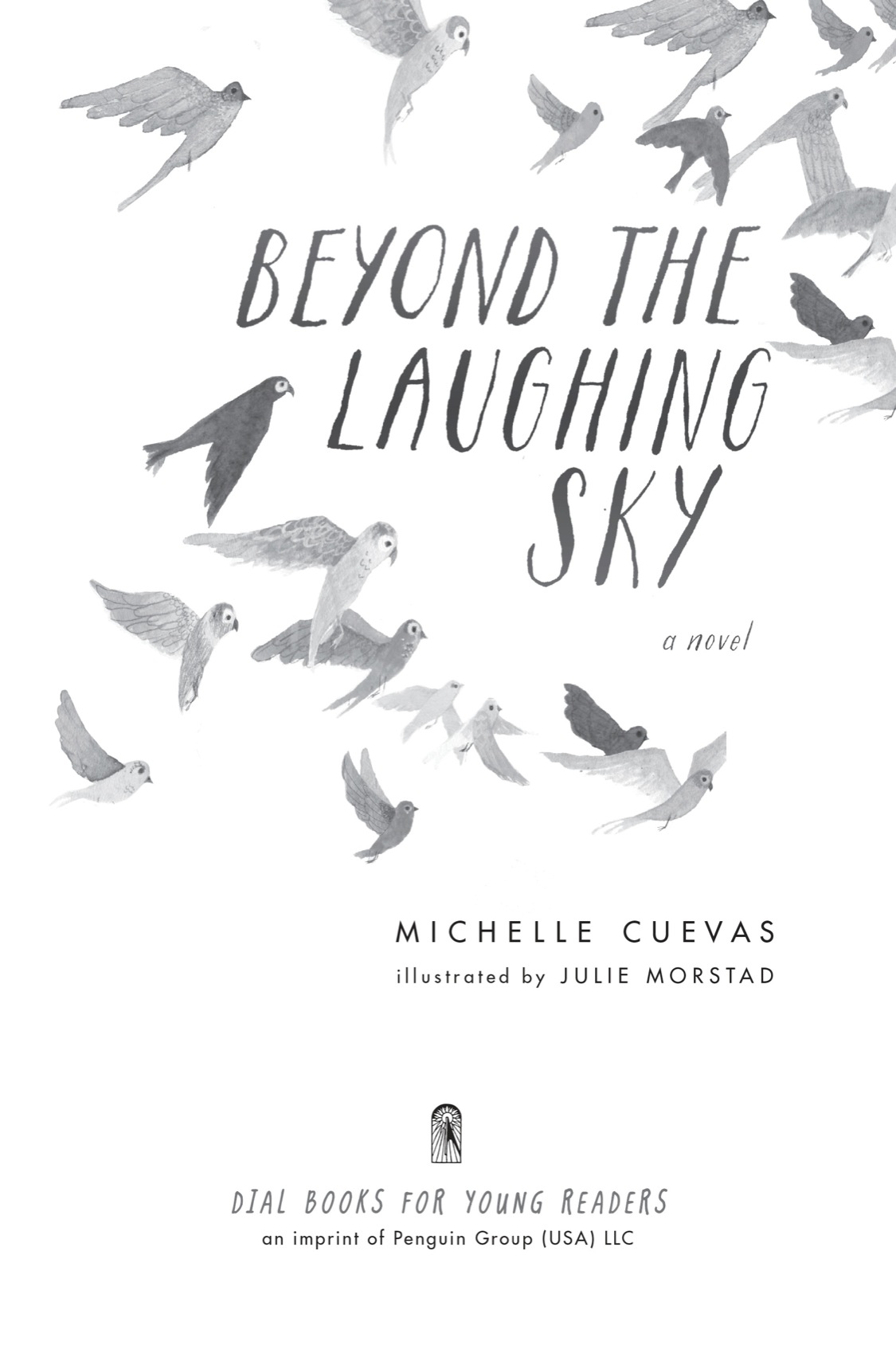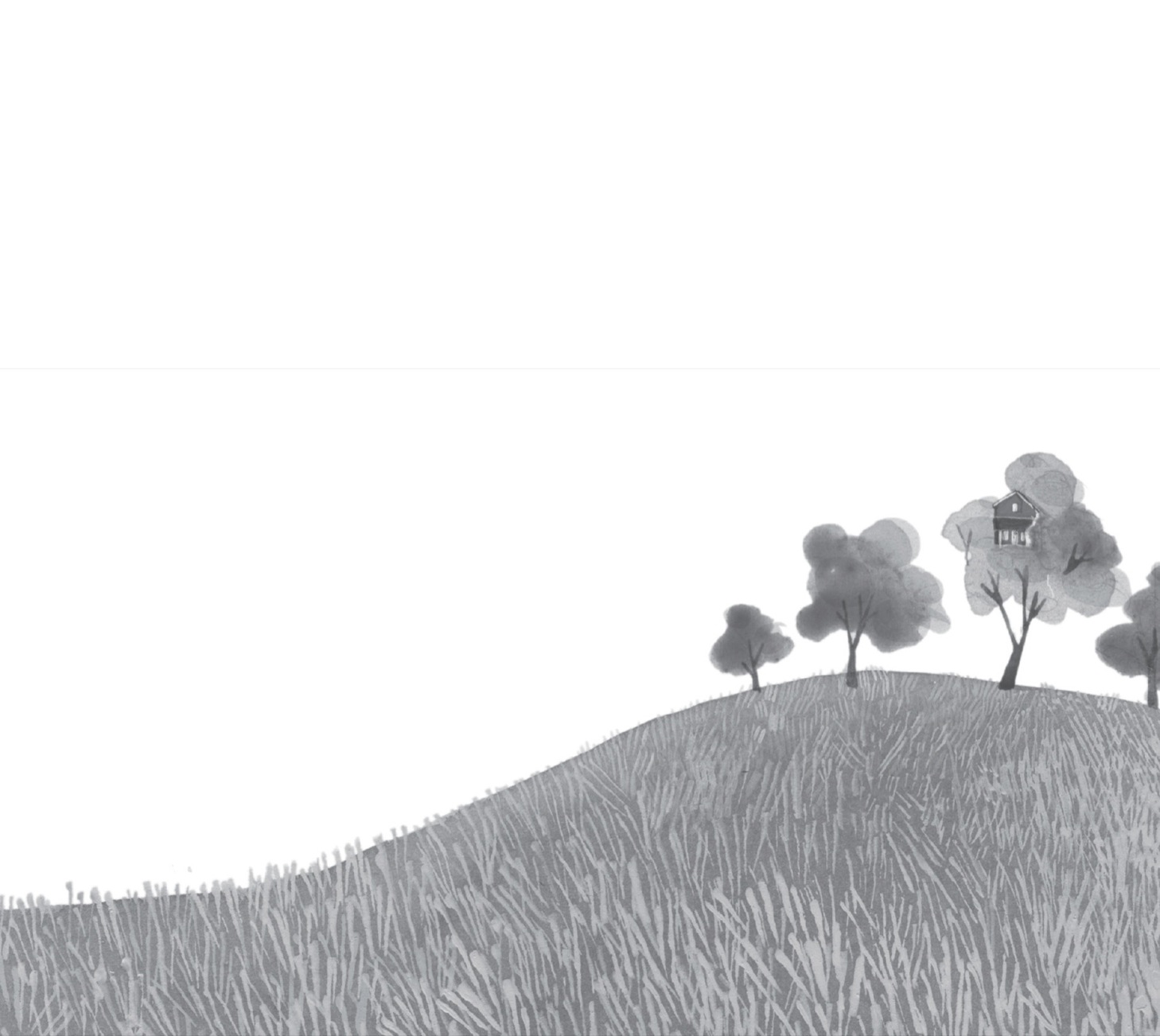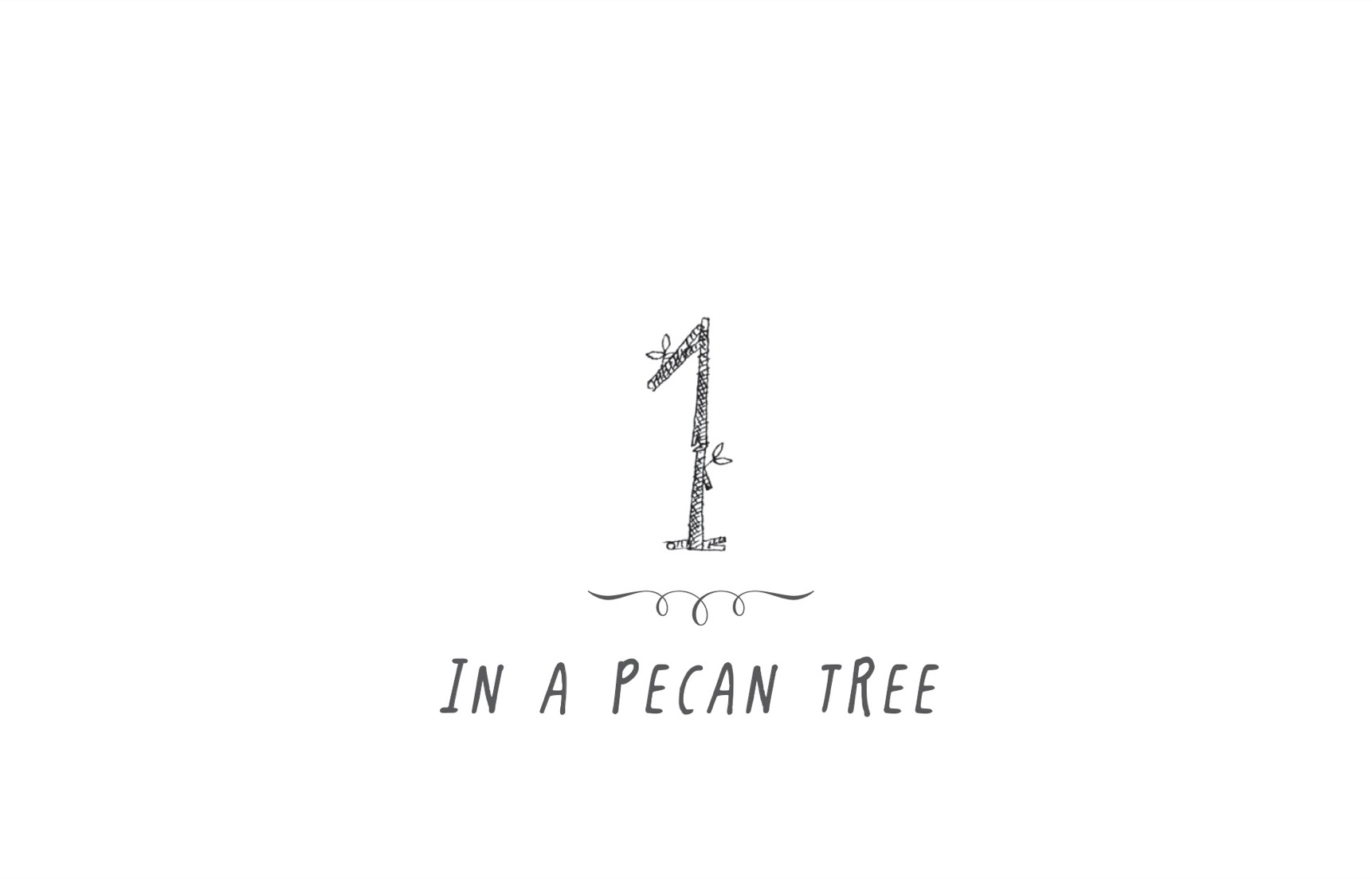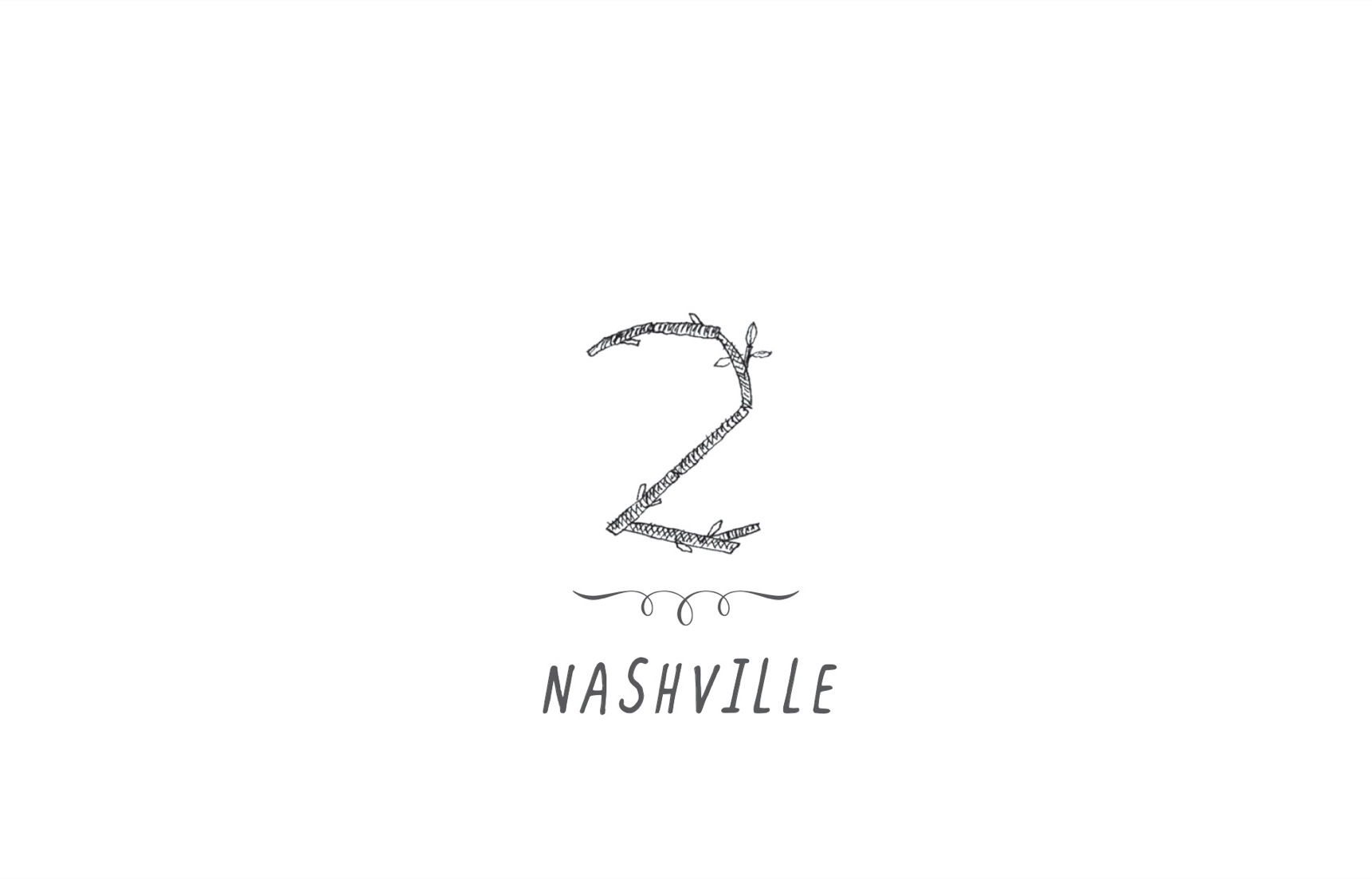Beyond the Laughing Sky
Read Beyond the Laughing Sky Online
Authors: Michelle Cuevas



DIAL BOOKS FOR YOUNG READERS
Published by the Penguin Group
Penguin Group (USA) LLC
375 Hudson Street
New York, New York 10014

USA / Canada / UK / Ireland / Australia / New Zealand / India / South Africa / China
Â
Â
A Penguin Random House Company
Â
Text copyright © 2014 by Michelle Cuevas
Illustrations copyright © 2014 by Julie Morstad
Â
Penguin supports copyright. Copyright fuels creativity, encourages diverse voices, promotes free speech, and creates a vibrant culture. Thank you for buying an authorized edition of this book and for complying with copyright laws by not reproducing, scanning, or distributing any part of it in any form without permission. You are supporting writers and allowing Penguin to continue to publish books for every reader.
Â
Library of Congress Cataloging-in-Publication Data
Â
Cuevas, Michelle.
Beyond the laughing sky / by Michelle Cuevas. pages cm
Summary: Hatched from an egg and raised by a loving family, ten-year-old Nashville is more bird than human except for his lack of wings, but he and his classmates learn that differences need not keep them apart.
ISBN 978-1-101-60009-2
[1. Belonging (Social psychology)âFiction. 2. IndividualityâFiction. 3. Self-acceptanceâFiction. 4. Family lifeâFiction. 5. OrphansâFiction. 6. TransformationâFiction.] I. Title.
PZ7.C89268Bey 2014 [Fic]âdc23 2013034416
Â
The publisher does not have any control over and does not assume any responsibility for author or third-party websites or their content.
Version_1

FOR MY LITTLE BROTHER, CHRISTOPHER, WHO TOLD ME THE ENDING
âM.C.

Chapter 7: THE TOAST & JAM TRAPEZE TROUPE
Chapter 8: NOTHING TO BE FIXED
Chapter 9: HAVE YOU EVER SEEN A PLATYPUS?
Chapter 17: A GADGET, A GIZMO, AN INVENTION
Chapter 18: BOX OF QUESTIONS, SUITCASE OF FEATHERS
Chapter 19: ENCHANTED BALLOONS
Chapter 20: FEATHERS DON'T FIT IN
Chapter 21: WHEN IT RAINS IN GOOSEPIMPLE
Chapter 23: QUESTIONS AND ANSWERS
Chapter 31: BEYOND THE LAUGHING SKY
Chapter 32: A SONG TO SING YOU HOME

N
ashville and his family lived in a house perched in the branches of the largest pecan tree in the village of Goosepimple. The tree grew on the top of a high hill, and the hill overlooked the small, perfect village, where the sun always shined, the grass was always mowed, and the men strutted like doves in their gray suits.
The house in the pecan tree, however, was often shrouded in fog like the purple-gray gloom of an aged bruise, causing the old men in town to sit on their porches, drink sweet tea, and gossip.
“That tree on the hill looks like the last feather to be plucked from the pimpled skin of a goose.”
“Naw, it looks like the last sprig of hair on an ancient bald head.”
“Naw, it looks like the last white ghost seed waiting to fly away from a dandelion.”
Tourists often wanted to drive up the one creeping road that led to the top and visit the house, but once they got close realized they had somewhere else to be or something else to do. When they stopped by the town visitor center they would say, “That house in that tree is not like the rest. Was it built there? Was it built like a nest?”
“Oh no, sugar,” the old widow working at the visitor center would say. “That house sat on a small street in town for nearly a century. Then, ten years ago, there was a flood the likes of which this area had never seen. It started raining as hard as it could in March, and it didn't stop until June. Can you imagine that?” The widow paused, allowing the visitors to imagine that amount of precipitation. “Needless to say,” she continued, “the rivers and swamps and the bayou overflowed. The foundation of the building came loose and the whole place just floated away, bobbing on the water like a toy in the tub. The water rose all the way over that hill, and when the rain stopped, the house was stuck in that pecan tree like a mouse in a hawk's claw.”
“Who lives there now?” asked the tourist.
“A sweet young couple and their little girl,” replied the widow.
“How precious.”
“And also . . .” the widow paused. “And, well, that
boy
.”
“What boy?”
“What boy, indeed,” replied the widow. “What boy hatches from an egg?”
“Oh, fiddlesticks,” a Southern gentleman said to the widow. “A boy can't hatch from an egg. That's impossible”
“What an absurd little word,” the widow replied.
“Pardon?”
“You said impossible,” the widow pointed out. “There's no such thing. There's things you've seen and things you may not have, but there ain't nothing that's impossible, sugar.”

I
mpossible. improbable. inconceivable. if the children from far-flung villages who came to catch a glimpse of Nashville had better vocabularies, perhaps these are words they would have used. As it stood, they would ride their bikes to the base of the hill after sunset, their brakes screeching like the call of a night bird, with hopes of seeing something they called just plain
weird
.
“I double-dog super dare you to go up and knock on the door and get a look at him.”
And then they'd look and look at the house without moving, their hearts pounding like hoofbeats. They'd imagine they saw a light come on, or a curtain billow out like it had bones.
“I saw him!” they would shout to the wind, pedaling fast. “He's half boy, half bird!”
Had Nashville heard their words it wouldn't have mattered, for he really did look how they saidâwhy, the truth of the matter was, he looked like a bird in almost every way. He was the size of a normal boy, perhaps a tad small for his age, but he had feathers for hair and a beak for his nose and mouth. His eyes were sharp and golden and his legs too long and thin. But when it came to clothing, Nashville was fond of bow ties and hats, and this made him about as alarming as a puppy in a paisley suit. He was, however, extraordinary, and that tended to scare townsfolk, who were hooked on the Ordinary with a capital
O
, and preferred their day-to-day served without any Extra.
Nashville was one of a kind, and he had a way of stirring up whispers in town, causing the old women to sit in the beauty parlor, get their hair curled, and gossip.
“That youngster looks like a dodo bird in a dinner jacket. What's next? Turtles in tuxedos? Skunks in swimsuits?”
“I'm just glad he doesn't have wings.”
“Oh! Can you imagine that? Some whippersnapper flying around, peeping in our windows.”
It was true. The only avian attribute Nashville seemed to be missing, much to his disappointment, was a pair of wings. But he had everything else. Why, by the time he was a baby barely out of the egg, Nashville was not only looking like a bird, but acting like one, tooâchirping instead of crying for food, preferring sunflower seeds to milk, and only settling down to sleep in the bed his parents had custom made just for him, the one carpenters had been consulted and hired to build. Branches had been soaked, bent, and twisted. The nest was as large as a bed, and made up with pillows and a soft blanket.
“Did you make your nest?” his mother asked Nashville every morning.
“And Junebug,” she asked his little sister. “Did you make your bed as well?”
“I want to sleep in a nest,
too
,” whined Junebug, with the misguided jealousy of a younger sibling. She was only eight, but Junebug often seemed older and wiser, and Nashville enjoyed her company. And so, from time to time, Nashville would allow his sister, Junebug, to sleep with him in his boy-sized nest.
Sometimes, especially when he was alone, Nashville would stand for a long time at his bedroom window. The interior of the house glowed green due to all the leaves outside, and was like being in the cabin of a ship that sank in an algae pond. Sometimes Nashville felt as if his soul was waiting just under the surface of his skin, ready to leap like a fish into the cool, crisp air above.
But no. Nashville couldn't fly, that was for certain, so there was no reason for his strange desire to leap. Plus, he loved living in a pecan tree. When it was windy, the branches around the house danced and made shadow puppets on the walls. When the birds sang, he and Junebug imagined that from the outside, it must seem like the tree itself was singing.
“If a tree could sing,” asked Junebug, “what do you think it would sing about?”
“I suppose,” replied Nashville, “it would depend on the tree. A tree starts as a sapling. If it's luckyâif it's not mowed or mocked, chewed or choppedâthe tree sets roots. The tree grows branches. The tree sprouts leaves. And every part, down to the smallest speck of bark and the tiniest vein of a leaf, is shaped by the worldâthe particular world around the tree. One less storm, one more insatiable caterpillar, any twist or turn along the way, and the tree would be changed. The tree would have a different song to sing.”
Junebug thought deeply about this. “I wonder,” she said finally, “what those pines at the edge of town sing about.”
“Junebug,” said Nashville. “You know I've never been past those pines.”
“Yeah. Me neither,” said Junebug. She looked at Nashville who was staring into the distance.
“Nashville?” she continued. “I think I'd like to stay here in our tree for always. Wouldn't you?”
“Of course,” Nashville replied, with only the slightest hint of doubt. “I'd like to stay here forever, too.” Anything else seemed, well, downright Impossible, Improbable, and Inconceivable.